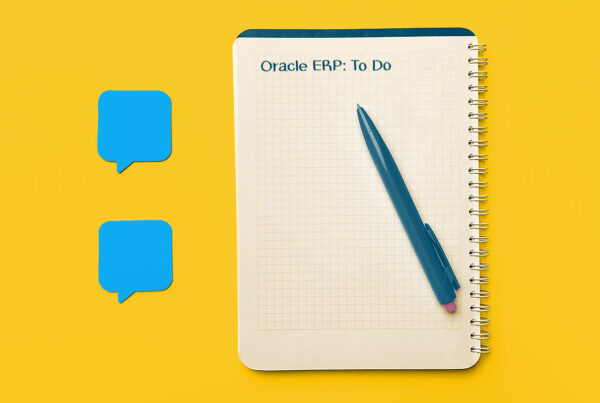For those of us who live and breathe ERP, talking about Oracle can bring up many pain points and PTSD around the laborious hours it took to get it up and off the ground. For some of us, there is a time and a place for these types of conversations, and most of the time they are put on the back burner. Let’s be real, who wants to come back from the Labor Day holiday and tackle an ERP customization or implementation discussion. No one!
Even though the topic is dreaded amongst most IT Business leaders, it’s an important conversation to have. The question always leans toward: “What is it that Oracle is not doing for us today?” Most often, when this question is asked, the tool review process begins, and the functionality is evaluated. What tools are we using and for what? How long ago did we update it? Is it generating the right workflows? And the list goes on and on and on.
Now, as we know, there are many different types of Oracle products that begin these conversations. Some, of which, create more tension than others. You have your core Apps set (EBS), your BI Apps, Point-of-Sale, etc. I want to focus on the grandchild of any Oracle shop – Oracle Forms. Yes, I said the “F” word…Forms! If you have been involved with any organization that uses Oracle, I can 99.9% guarantee that you have run into this tool in your environment.
Every organization uses forms differently, but there is one thing that remains constant – the UI never changes. Yes, you know you love them. Those outdated Java forms that you can’t get out of your brain if you tried are the same for each and every one of us. So, how do we get around that? Well, something has been around since 2006 that easily replaces Forms…Oracle Application Express also known as APEX (pronounced AY-PECKS).
APEX is a low-code, web development toolkit that allows you to manipulate your Oracle data and present it in a modern UI—and makes it live. Many organizations find it useful to extend their ERP environment or use it as a gap-fill technology for a use-case that the current environment can’t fulfill. Most importantly, in the case of Forms, it serves as an exceptional Oracle Forms replacement.
Let’s say you manage a large manufacturing environment and are implementing a new Oracle Form in a new shop and everyone there is used to web-based forms. You implement an Oracle Form and they feel like they were brought back to 1975…not only does this cause a training headache, it lessens the satisfaction of your employee to work in Oracle. APEX comes in and saves the day—bringing in a modern UI, and simply replacing the exact functionality of the existing form.
All of this aside, APEX is not intended to be a full Enterprise ERP system replacement, but it can help in certain areas. For instance, if you are working out of countless spreadsheets to run your business, APEX can take that data and dump it in Oracle, and everyone can see it live.
Whether or not you are using Oracle Forms and are ready for an updated UI, your EBS environment isn’t doing something for you, or you’re tired of the outdated spreadsheets, APEX could be the lifejacket that keeps you afloat. Traust Consulting has the toolkits and resources to get you through this journey, and often hosts educational events to keep you informed of these capabilities. We are always happy to answer your questions.
Written by Dietrich Jessen, Client Development & Education Specialist





